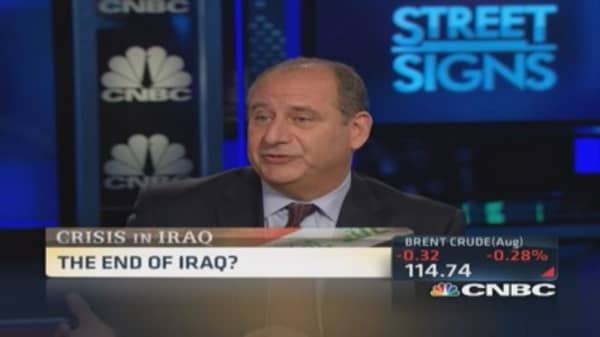Last week, Sunni jihadis from the Islamic State of Iraq and Syria (ISIS) poured across the Syrian border and routed the Iraqi army in Mosul, Iraq's second largest city. ISIS raced across the desert, encountering little resistance in the Sunni heartland. They attacked Baquba just 25 kilometers from Baghdad. ISIS also advanced to the outskirts of Samarra, the site of the Great Golden Dome Mosque, one of Shia Islam's holiest shrines. Samarra has historic significance. Iraq's civil war erupted when Sunnis blew up the golden dome in 2006.
Read MoreViews from Kurdistan: Iraqi refugees flee fighting
A stalemate currently exists. So far, the Kurds have avoided military engagement. It's not their fight.
If Iraq disintegrates, the United States can still preserve its core interests by working in conjunction with the Kurds. Iraqi Kurdistan is pro-Western, secular, and democratic. It has a proven track record of security and economic cooperation with the West.
In addition, Iraqi Kurdistan is rich in minerals and energy supplies. There are 45 billion barrels of proven oil reserves and vast natural gas fields. Exxon and other U.S. energy companies have a stake.
Iraqi Kurdistan and Turkey, America's ally and NATO member, are working closely together in the energy sector. Energy supplies from Iraqi Kurdistan are transported via new pipelines to Ceyhan, a Turkish port on the Eastern Mediterranean. Natural gas from fields northeast of Suleimani will feed into the Nabucco pipeline, supplying Turkish and European markets.
In the past, Turkey strongly opposed independence for Iraqi Kurdistan. It worried that Turkish Kurds, who number about 20 million, might want the same.
Read MoreShouldn't US energy boom sideline Iraq, a little?: Cramer
However, the Turkish government has entered into peace talks with Abdullah Ocalan who leads the PKK, a militant Kurdish organization. The PKK announced a ceasefire and withdrawal of forces. Turkey's Prime Minister Erdogan has promised greater political and cultural rights. Turkey's recognition of Iraqi Kurdistan's independence could be part of a grand bargain decommissioning the PKK and reforming discriminatory laws against Kurds.
Additionally, an independent Iraqi Kurdistan would serve as a buffer between Turkey and Iraq. It could help prevent chaos, violence, ad refugees from spilling across the border.
Iraq was an artificial construct created by Great Powers at the end of the Ottoman Empire. Shiites and Sunnis have been in conflict for 13 centuries. Reconciliation is an even more remote possibility under current conditions of deadly violence.
Read MoreKeystone pipeline debate: Iraq's turmoil sharpens arguments
Instead of trying to placate its adversaries, the Obama administration should support the Kurds. It must see Iraq as it is, not how it wants Iraq to be. Wishful thinking is not a policy, nor effective crisis management. A new map of the Middle East is emerging.
Commentary by David L. Phillips, director of the Program on Peace-building and Human Rights at Columbia University's Institute for the Study of Human Rights. He is a former senior adviser and foreign affairs expert to the U.S. Department of State during the administrations of Presidents Clinton, Bush and Obama. He is also author of the forthcoming book, "The Kurdish Spring: A New Map for the Middle East" (Transaction Publishers).
Read MoreWill Iraq be the trigger for a market correction?: NYSE floor trader





